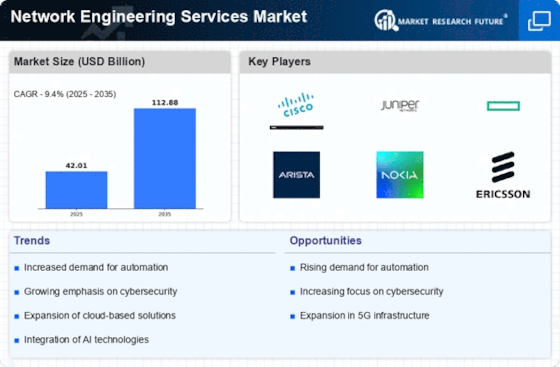Top Industry Leaders in the Network Engineering Services Market

Competitive Landscape of the Network Engineering Services Market:
The global network engineering services market is thriving, This dynamic space encompasses a vast array of players, each vying for a piece of the pie. From established industry giants to nimble startups, understanding the competitive landscape is crucial for navigating this lucrative field.
Key Players:
- Cisco
- IBM
- Ericsson
- Huawei
- Juniper Networks
- HCL Technologies
- Infosys
- NTT Global Networks
- Fulitsu
- Cyient
- CSS Corp (US) Accenture
- Aviat Networks
- AT&T
- Wipro
- TOS
Strategies Adopted by Key Players:
The market is dominated by established players like Cisco, Huawei, IBM, and HPE, leveraging their extensive experience, global reach, and comprehensive service portfolios. These companies employ multi-pronged strategies, including partnerships with technology vendors, M&A activity to expand offerings, and investments in R&D for cutting-edge solutions like SDN and NFV.
Regional players like NTT DATA in Japan and Deutsche Telekom in Germany hold significant sway in their respective markets, capitalizing on local knowledge and strong customer relationships. Boutique specialists, focusing on niche areas like cybersecurity or cloud network optimization, also hold their own by providing highly specialized expertise.
Factors for Market Share Analysis:
Analyzing market share in this fragmented landscape requires consideration of several factors:
- Service Portfolio Breadth: Companies offering a full suite of services, from network design and deployment to ongoing maintenance and optimization, hold an advantage.
- Geographical Reach: Global presence with local delivery capabilities allows companies to cater to diverse needs across regions.
- Technological Expertise: Demonstrated proficiency in cutting-edge technologies like automation, AI-driven tools, and security solutions attracts clients seeking future-proof networks.
- Pricing and Delivery Models: Competitive pricing, flexible engagement models like managed services, and subscription-based options cater to budget constraints and varying client needs.
- Client Relationships: Building strong partnerships with clients, understanding their unique challenges, and offering customized solutions foster loyalty and market share gains.
New and Emerging Companies:
The influx of new and emerging companies with innovative approaches is keeping the market dynamic. Startups like Arrcus, offering cloud-native network solutions, and Cloudfare, with their distributed network platform, are disrupting traditional models. These companies leverage agility, focus on specific pain points, and cater to cloud-first businesses, carving out their niches.
Cisco:
- Date: October 26, 2023
- Event: Unveiled Cisco SecureX platform, an integrated suite of security solutions aimed at streamlining threat detection, investigation, and response across hybrid and multi-cloud environments. This aligns with the growing demand for robust cybersecurity solutions in network engineering.
- Date: July 18, 2023
- Development: Announced intent to acquire Acacia Communications, a leader in optical networking technology, for $4.5 billion. This move strengthens Cisco's position in high-speed networking solutions crucial for 5G and cloud deployments.
- Ongoing Trend: Focus on Software-Defined Networking (SDN) and Intent-Based Networking (IBN) solutions, enabling automation and simplified network management, particularly relevant for managing complex hybrid and multi-cloud networks.
IBM:
- Date: November 15, 2023
- Partnership: Collaborated with Google Cloud to offer managed network security services leveraging IBM Security QRadar and X-Force Threat Intelligence on Google Cloud's Anthos platform. This caters to the increasing demand for secure cloud-based network solutions.
- Date: September 27, 2023
- Announcement: Introduced IBM Cloud Pak for Network Automation, a suite of AI-powered tools designed to automate and optimize network management tasks. This addresses the growing need for intelligent automation in network operations.
- Ongoing Trend: Emphasis on hybrid cloud network services, leveraging IBM's expertise in managing on-premises and cloud infrastructure, catering to the widespread adoption of hybrid cloud environments.









